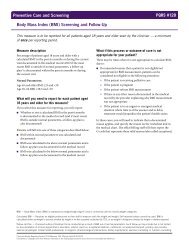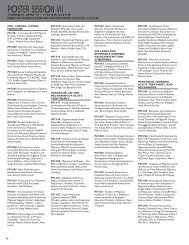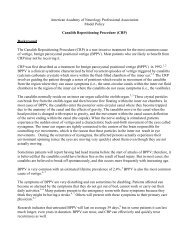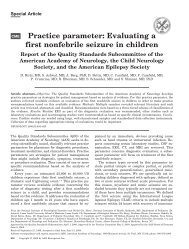Read the Case-Based Curriculum for Neurology Residents.
Read the Case-Based Curriculum for Neurology Residents.
Read the Case-Based Curriculum for Neurology Residents.
Create successful ePaper yourself
Turn your PDF publications into a flip-book with our unique Google optimized e-Paper software.
1.0<br />
l.t<br />
t.2<br />
1.3<br />
t.4<br />
1.5<br />
1.6<br />
1.7<br />
1.8<br />
THE NEUROLOGIST-PATIENT RELATIONSHIP<br />
The Practice of <strong>Neurology</strong><br />
The profession<br />
neurology exists primarily ro srudy, diagnose and treat disorders of <strong>the</strong><br />
nervousystem The neurologist-parient relationship <strong>for</strong>ms <strong>the</strong> foundation <strong>for</strong> neuroloqic<br />
care.<br />
Fiduciary and Contractual Basis<br />
The neurorogists has fiduciary and contracruar duties to patients. As a fiduciary, <strong>the</strong><br />
neurologist has an ethical duty to consider <strong>the</strong> inreresrs of<strong>the</strong> patient firsr. As a pany ro an<br />
rmplied contract, <strong>the</strong>.nzurorogist has a duty to practice competently and to respect patients'<br />
autonomy, confi dentiality, and welfare.<br />
Beginning and Ending <strong>the</strong> Relationship<br />
The neurologist is free to decide whe<strong>the</strong>r or nor to undenake medical care ofa panicular<br />
person. The neurologist mu$ not decline a padent on <strong>the</strong> basis ofrace, religion] natlonalrty,<br />
or gender. once <strong>the</strong> relationship has begun, <strong>the</strong> neurologistrnurt pro,rid. clre untrl<br />
complete,<br />
care is<br />
<strong>the</strong> patient ends <strong>the</strong> relationship, or <strong>the</strong> neurologist returns rhe patient to<br />
<strong>the</strong> referring<br />
<strong>the</strong><br />
physician.<br />
care of<br />
If<strong>the</strong> neurologisi justifiably desire-s to end <strong>the</strong> relalrionsiip,<br />
conunued<br />
and if<br />
neurorogi care is appropriare, he/she should assist in ",,unginf;;"<br />
neurologist.<br />
iy "nott ",<br />
In<strong>for</strong>med Consenl<br />
The neurologist must obtain <strong>the</strong> patient's consent <strong>for</strong> tests or treatment.<br />
should<br />
The neurologisr<br />
disclose inf:1nali9n that <strong>the</strong> average person would need to know<br />
appropriate<br />
to make an<br />
medical decision. This in<strong>for</strong>mition should include ben.nt.,<br />
altematives<br />
;rtf-"orts,<br />
to <strong>the</strong> proposed.tr^eatment.<br />
ano<br />
If<strong>the</strong> patient lacks medical a""i.ion--"r.ing<br />
<strong>the</strong> neurologist capacrry,<br />
must obtain in<strong>for</strong>med consent fiom an appropriate proxy.<br />
Communication<br />
The neurologist has a duty to communicateffectivery with <strong>the</strong> patient. The<br />
shoutd<br />
neurologist<br />
convey ret":::::1"::l* in terms <strong>the</strong> patienr can undersrand "nJ<br />
opponunity<br />
Jtoi uo"quu,.<br />
<strong>for</strong> <strong>the</strong> patient to raise questions "nd dir"ur, rnutt"., ,.l"t.Jio """i."*<br />
Emergency Care<br />
In an emergency situation, <strong>the</strong> neurologist should render services to <strong>the</strong> patient<br />
hivher<br />
to <strong>the</strong><br />
ability<br />
best<br />
while<br />
of<br />
obtaining inrormea consent is desirable be<strong>for</strong>e beginning treatment,<br />
neurologist should<br />
<strong>the</strong><br />
not delay urgently needed treatment because of concerns about<br />
consent.<br />
in<strong>for</strong>med<br />
Medical Risk to <strong>the</strong> Phvsician<br />
A neurorogist should not.refuse to care <strong>for</strong> a padenr sorery because of<strong>the</strong> rear or perceived<br />
medical risk to <strong>the</strong> neurorogist. The neurorogist shourd tike appropriate p."*riiinr,o<br />
minimize his/her medical risk.<br />
Medical Decision-Making<br />
The patient has <strong>the</strong> ultimate right.to accept or reject <strong>the</strong> neurologist's recommendatron about<br />
medical treatment The neurolo_gist should respect decisions.ui" uy puti"ni, nJtr, o""i.ionmaking<br />
capacity and by <strong>the</strong> lawfur proxy of patienrs who lack decision-making cafacny.<br />
neurorogist<br />
If<br />
cannot<br />
<strong>the</strong><br />
honor <strong>the</strong> patient's or proxy's decision, <strong>the</strong> neurologisi sho-uta !".r to















![[Click here and type date] - American Academy of Neurology](https://img.yumpu.com/8582972/1/190x245/click-here-and-type-date-american-academy-of-neurology.jpg?quality=85)
